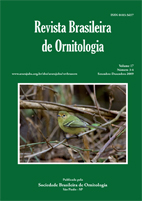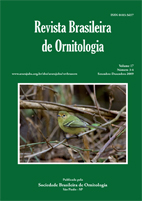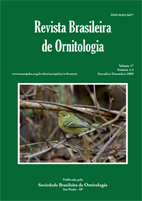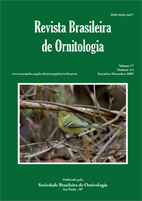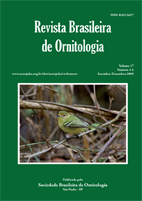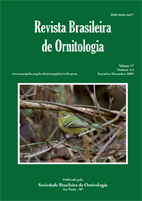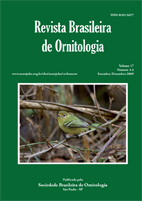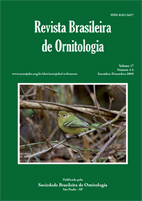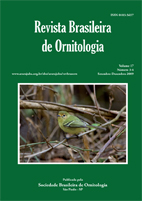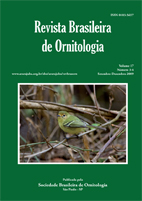Volume 17, Numbers 3:04 - September / December 2009
Editor: Luis Fabio Silveira
São Paulo, SP
Pages: 58
Editor: Luis Fabio Silveira
São Paulo, SP
Pages: 58
Full Issue
| View or download the full issue |
Table of Contents
Article
| Birds of Pantanal forest patches and their movements among adjacent habitats | ||
| Regina Souza Yabe | 10 |
| Spacial and temporal distribution of waterbirds in Santo Amaro Lake, Parque Nacional dos Lençóis Maranhenses, Maranhão, Brasil. | ||
| Antonio Augusto Ferreira Rodrigues, Roberta Kelly Pinheiro Soares | 10 |
| Comparative analysis of eleven passerines' density in two urban areas at Londrina city, Northern Paraná, Brazil. | ||
| Luiz dos Anjos, Barbara Rocha Arakak, Carla Alves Pacheco da Silva, Ângela Regina Souza, Tábata Melise Gomes, Gihan Teixeira Jebai | 4 |
| Feeding behavior of Aratinga aurea (Psittacidae) in southwestern Minas Gerais State, Brazil. | ||
| Luiz Octavio Marcondes Machado, Sandra Jammal Paranhos, Carlos Barros Araújo | 7 |
| Composition and behaviour of avian nectarivores in Erythrina falcata (Leguminosae) in two consecutive flowerings that differed in intensity. | ||
| Izar Aximoff, Leandro Freitas | 10 |
| Vireo olivaceus chivi and V. o. diversus (Vireonidae): distribution and migration. | ||
| Patrícia Capllonch, Eugenia Moyano Wagner | 6 |
Note
| An alternative water source for the Blaze-winged Parakeet, Pyrrhura devillei? | ||
| Franco Leandro Souza, Massao Uetanabaro, Paulo Landgref Filho, Gabriel Faggioni | 7 |
| First record of Sporophila leucoptera (Emberizidae) in Rio Grande do Sul, Brazil. | ||
| Rafael Gustavo Becker | 4 |
| First records of Phylloscartes roquettei Snethlage, 1928, in Bahia, northeastern Brazil. | ||
| Sidnei Sampaio dos Santos, Francisco Pedro Fonseca Neto, José Fernando Pacheco, Ricardo Parrini Alves Serpa | 3 |
| First breeding record of Minas Gerais Tyrannulet Phylloscartes roquettei Snethlage, 1928 in Bahia, Brazil | ||
| Ciro Albano | 2 |
** The work of the Editor in Chief, Managing Office, Associate Editors, and the Editorial Council of Revista Brasileira de Ornitologia is strictly voluntary, and does not involve the use of any resources and infrastructure other than the personal ones**




